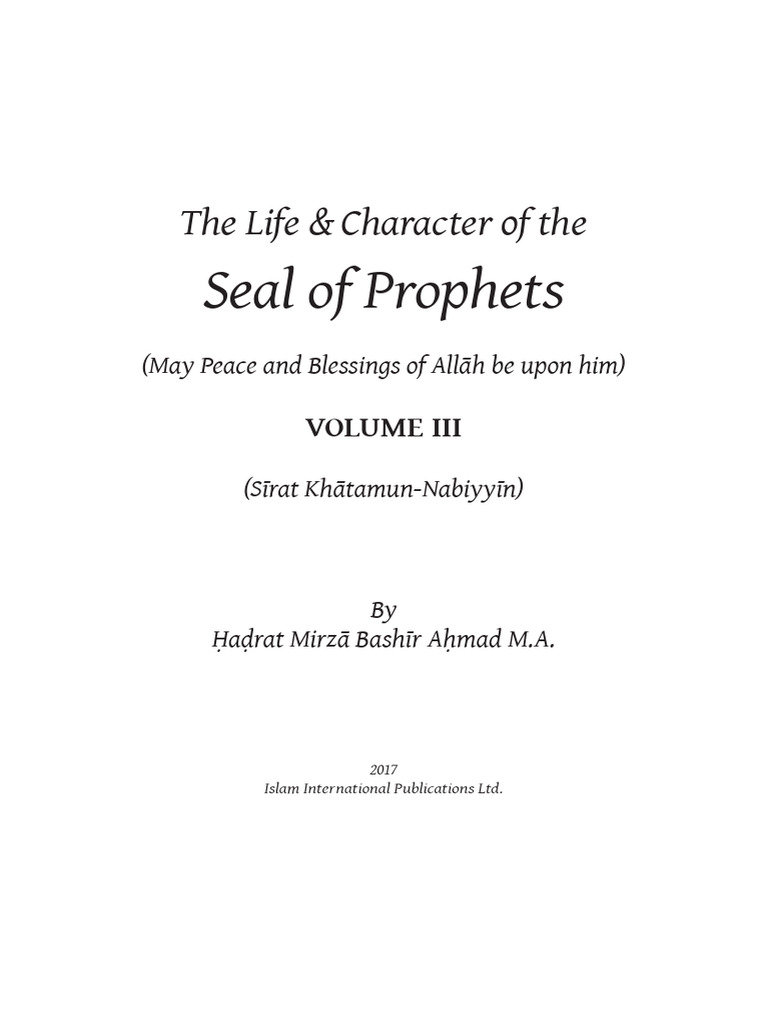In the realm of religious thought, the Bahá’í teachings represent a unique tapestry woven with threads of unity, diversity, and profound spiritual insight. Central to this framework is the concept of the “Seal of the Prophets,” a title bestowed upon Muhammad and imbued with deep significance. However, the Bahá’í Faith invites followers to reconsider this notion, to delve into the layers of meaning hidden within this metaphor and to unfurl its implications for humanity’s collective spiritual evolution.
First and foremost, the term “Seal of the Prophets” can be elucidated through the metaphor of a treasure chest—one that, though sealed, guards treasures of wisdom and insight within. In the Bahá’í perspective, this seal does not imply an end but rather a new beginning. The treasures contained are not confined to the teachings of a single prophet but encompass the cumulative wisdom of all divine messengers throughout history. Just as a treasure chest is designed to be opened, the teachings of Bahá’u’lláh encourage humanity to unseal the wisdom and illumination provided by past prophets, facilitating a deeper understanding of the divine will.
To appreciate the unsealing of this metaphor, one must first consider the relationship between the individual and the divine. Bahá’u’lláh emphasizes that every person is endowed with the potential to know and love God. This connection acts as a divine spark, a catalyst that ignites the pursuit of spiritual truth. The teachings of the Bahá’í Faith advocate for a personal exploration of faith that transcends dogma and tradition. An individual’s quest for truth is akin to a seeker searching for a key to unlock the treasure chest, revealing layers of divine wisdom.
Diving deeper into the metaphor of the unsealed treasure chest, the significance of the diverse teachings across various faiths becomes all the more apparent. Each prophet brings forth a unique perspective, much like varying gems that adorn the chest. These teachings, while distinct, resonate with a harmonious core that underscores the principle of the oneness of humanity. The Bahá’í Faith posits that all major world religions stem from a singular divine source, reflecting the same spiritual truths adapted for different cultures and epochs. As seekers of truth, Bahá’ís are encouraged to appreciate and learn from these diverse teachings, thereby enriching their own understanding of God’s message.
Moreover, the concept of unsealing the Seal of the Prophets invites a reconsideration of the role of religion in society. Historically, religions have often served as frameworks for community and moral guidance. However, the Bahá’í teachings advocate for a more dynamic interaction between faith and the evolving realities of the world. This perspective positions religion not as a static entity but as a vital force for social transformation. Each generation is called to reinterpret religious teachings in light of contemporary challenges, working towards justice, equity, and peace. The process of unsealing thus becomes a collective endeavor, one that draws on the insights of all humanity in its quest for a unified existence.
As one engages with the scriptures and understandings within the context of Bahá’í teachings, the dynamic nature of spiritual evolution emerges. This evolution is akin to layers of an onion—each unpeeled layer revealing new insights and deeper comprehension of the divine purpose. The teachings of Bahá’u’lláh, as seen in the writings of the Bahá’í Faith, encourage individuals to peel back these layers, to question, to reflect, and to engage in a lifelong process of spiritual development. Through this journey, the seeker not only discovers personal meaning but also contributes to the collective enlightenment of humanity.
The metaphor extends further when considering the social implications of unsealing the Seal of the Prophets. The Bahá’í teachings emphasize cooperation and the elimination of prejudice in all forms. This perspective can be likened to the dynamic interdependence found in a vibrant ecosystem, where each element plays a crucial role in maintaining balance and harmony. By unsealing the treasures of understanding inherent within diverse faith traditions, humanity can foster an interconnectedness that transcends cultural and national boundaries. The unsealing thus serves as a means of nurturing compassion, empathy, and a genuine recognition of shared values across different societies.
In a world beset by division and conflict, the invitation to unseal the Seal of the Prophets becomes increasingly relevant. It serves as a clarion call for individuals to bridge divides through dialogue and understanding. Each person carries within them the potential to be a conduit of divine guidance. Engaging deeply with the teachings of the prophets provides not just answers, but the inspiration to exert positive change in one’s community and beyond. It is through this lens of actionable spirituality that the Bahá’í teachings resonate, embodying a profound commitment to both personal and collective transformation.
In conclusion, the process of unsealing the Seal of the Prophets offers profound insights into the nature of spirituality, the evolution of religious thought, and the urgent need for social cohesion. By embracing the metaphor of a treasure chest brimming with divine wisdom, individuals can embark on a transformative journey that enriches both their personal faith and the broader tapestry of humanity. The Bahá’í teachings thus illuminate a path forward, one that not only acknowledges the indispensable contributions of past prophets but also celebrates the promise of a radiant future united in diversity and love.
